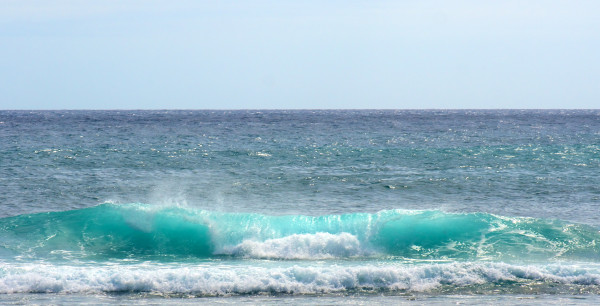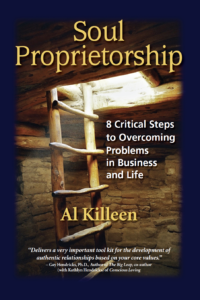There was once an island in the beautiful blue Pacific where two brothers lived. These brothers, Bob and Joe, loved each other greatly and grew up with joy and happiness in a wonderful family. However, they had very different tendencies when it came to how they should live on the island.
Bob, the older of the two, watched his father go to work every morning down to the bay. His father didn’t really enjoy his job on the bay, but he didn’t believe he had any choice but to work in the bay, since that was what his father had done before him. Every day his father would go and fish in the bay, which was surrounded by fishing nets that the owner of the company who controlled the bay had put up. The owner told his father where to fish, when to fish, and how long the fish. In exchange, the owner would give his father a paycheck every two weeks with great regularity. Bob and Joe’s family lived on the money that the owner provided his father for fishing in the bay, and as a result had a nice little home and enough to eat.
Bob, as the years passed, grew up yearning for the day when he could go to work in the bay and earn his own money. He would pick up driftwood and plastic bottles and trash from the beach in hopes that the owner of the bay would notice his great ambition and willingness to be a hard worker. The owner did notice, and often smiled to himself knowing that one day he would have another fishermen to work in his bay. In his free time, Bob would often fantasize about how “safe” he would be with the money he would earn from fishing. He would mend nets to help his father and talk to his friends about how great his life was going to be when he was grown up and he could fish in the bay. When his friends would talk to him about what life beyond the island might look like, he thought they were crazy. “We live in Paradise”, he would say to his friends, “so why would you ever want to be anywhere other than this island to live”? They would simply shake their heads, smile, and say to each other when Bob wasn’t within earshot, “that is so typical of Bob”!
Joe, the younger brother, had quite a different perspective on all of it. He wondered what life was like beyond the island. He watched his father go to work every morning and honored him for his great effort and love for his family that had him be willing to spend his life fishing in another man’s bay. He realized that fishing in the bay gave his father money (and therefore his family money) and he was very appreciative of the life that gave them all, but he couldn’t help but wonder what more existed beyond that bay. He even wondered if the owner of the bay couldn’t expand the nets to create a larger area for fishing out into the ocean beyond on the quiet, but limited waters of the bay.
In his free time, Joe wandered to the other side of the island where there were no fisheries, no nets, and no owners. The beautiful ocean seemed to go into infinity beyond the horizon, and Joe couldn’t help but wonder about the variety of fish, the depth of the ocean, and what lay on the other side of that ocean. He fantasized about what it would be like to go out on that ocean and experience the waves without the protection of the island, and with the possibility of finding new species of fish that might be bigger, faster, prettier, and even taste better. He even wondered, in his audacity, if he couldn’t keep those fish for himself or even hire others to fish for him in exchange for some of the fish or a paycheck.
One day Joe had a vision. His vision was to build a fishing boat on the other side of the island, outside of the prying eyes of the villagers who believed that everyone should be happy as a fisherman in the bay. He did this so he didn’t have to explain himself, or suffer the petty judgments of those who might think him crazy, ungrateful, or merely a dreamer. So he began. Every day after school he would go to the other side of the island and cut down trees, craft them into boards, and build a little more on his boat.
One day, Bob followed Joe to the other side of the island without Joe knowing. He saw a half-finished boat, and realized what his brother was doing. He ran home and told his father and mother what Joe was up to, and when Joe came home his parents confronted him. “What do you think you’re doing”, his father demanded, “by building a boat”? “Do you think you could take a homemade boat out onto the ocean and not die in the waves”? Joe simply looked down, not in shame as his parents thought, but in private realization that they wouldn’t understand, couldn’t understand. Joe knew that however beautiful life on the island was, without seeing what life on the ocean was and what may lay beyond it, his life would merely be a process of temporary enjoyment at the cost of long-term fulfillment.
The boys grew older into fine young men. Bob, as he desired, went to the owner of the bay one day and requested a job. The owner stroked his chin, looked like he was thinking about it, and agreed to bring Bob on as a fisherman in his bay. What Bob didn’t know was that the owner knew that Bob’s father was growing old and would have to be replaced, and Bob would be that replacement. Bob’s life went largely as planned, complete with marrying his childhood sweetheart and working happily in the bay as a fisherman. He had children of his own who watched him go off to work every morning in the bay, fishing for a living and bringing home a paycheck as his father did.
Joe, on the other hand, had quite a different path, as he grew older. While his parents scratched their heads over his desire to take his boat to sea, the day came when he did exactly that. Once out at sea, Joe had to learn how to be a seaman in addition to being a master fisherman. He had to fight the waves, learn the winds, and hire fellow seamen to help man his boat. He also had to learn to fish in new ways, because the fish out in the ocean were much bigger and had many more varieties than in the bay back home. He would return to the island every night with a boatload of fish most days, but some days with an empty boat.
As the islanders watched the two boys grow into old men, they noticed that little by little Bob became a person of routine, and quiet emptiness. While he was happy with his wife and children, and he didn’t really mind fishing in the owner’s bay, he did find as the days and years progressed that he would look out further to sea to try to glimpse Joe’s boat. He also secretly envied and simultaneously resented Joe for the growing wealth that Joe was building from his successful fishing fleet, (which that single boat has helped produce from the profits of all the fish through the years). Perhaps even more, he grew a quiet sense of disappointment in himself that he had not had the boldness to take the risk of becoming an ocean fisherman rather than merely a bay fisherman who worked for someone else.
What is the meaning of these two brothers on this nameless island for your life? Bob represents the desire for safety and security in all of us, and the illusion of control that comes from not taking risk in life. Joe represents the quest for possibility and self-actualization, and the willingness to take risk as a necessary price to pay for the growth and possibility of realizing our fullest potential.
Bob could not be an ocean fisherman like Joe unless he was willing to take greater risk and change his basic relationship with life. Joe, on the other hand, could have worked for the owner of the bay and still be a risk-taker. He could have helped the owner of the bay see how he could have moved his nets farther out into the ocean to expose the fishermen to more and better fish. He could have advised the owner of how to acquire more bays, more boats, and employ more fishermen. He could’ve partnered with the owner of the bay. He could’ve bought out the owner one day, and owned the bay himself. Or, he could have lived the life that he did now with his own fishing fleet, risks and all, but exposed to the possibilities of what he could truly become.
Bob represents employee-mindedness. Joe represents entrepreneurial-mindedness. Employees will always work for entrepreneurs. Entrepreneurs, however, may work for themselves or other entrepreneurs, but will never have the constraints of being merely employees. Why does this story matter?
It matters because we all have a decision to make in our lives and careers relative to risk and possibility. Am I going to go through life trying not to lose and operate as an employee, with one eye on the shore, (in hopes that someone in the bay will hire me), and running the true risk of never finding out who I could be? Or, am I going to take the risk of being an entrepreneur and find out not only how deep the ocean can be, and how frightening the ocean can be, but also how glorious finding new fish and taking the chance on my possibility can be?
Companies who are simply trying to maintain a secure future tend to hire, train, and control a culture of employees. Companies who want to realize their fullest potential commit to hire, train, and invite creativity, contribution and appropriate risk-taking from a community of entrepreneurs serving in employee roles.
This distinction separates those who are just not dead from those who are fully alive, and companies who can achieve true greatness and impact rather than mere survival when the marketplace allows it.
Does this mean that people who work for others are automatically employees? Not necessarily… Within traditional companies, it is usually the entrepreneurs who create new ways of adding value, customers and strategic thinking to the value proposition of the company, and are accordingly either promoted into positions of authority or go out and create their own company.
What kind of employees do the most effective managers want: employees or entrepreneurial? The first response might be, “well, obviously, we want employees who do what they are told!”. Perhaps, but what if this approach presumes that employees must be managed to comply rather than invited to create or add to the value proposition? Inspired, courageous, visionary managers may, instead, take the risk of hearing ideas they don’t like in the pursuit of hearing breakthrough solutions from creative and entrepreneurial employees who don’t threaten their ego. This takes a commitment to values and breakthrough outcomes, rather than the mere reinforcement of what has been true in the past. Therefore, these type of managers must, themselves, model appropriate risk-tolerant behavior.
What is your decision? Would you rather be Bob or Joe (whether you work for someone else or for yourself)?
You have the choice, you know….



